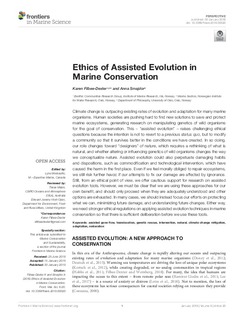| dc.contributor.author | Filbee-Dexter, Karen | |
| dc.contributor.author | Smajdor, Anna Colette | |
| dc.date.accessioned | 2019-11-21T10:09:42Z | |
| dc.date.available | 2019-11-21T10:09:42Z | |
| dc.date.created | 2019-10-21T11:57:32Z | |
| dc.date.issued | 2019 | |
| dc.identifier.citation | Frontiers in Marine Science. 2019, 6, 20. | nb_NO |
| dc.identifier.issn | 2296-7745 | |
| dc.identifier.uri | http://hdl.handle.net/11250/2629691 | |
| dc.description.abstract | Climate change is outpacing existing rates of evolution and adaptation for many marine organisms. Human societies are pushing hard to find new solutions to save and protect marine ecosystems, generating research on manipulating genetics of wild organisms for the goal of conservation. This – “assisted evolution” – raises challenging ethical questions because the intention is not to revert to a previous status quo, but to modify a community so that it survives better in the conditions we have created. In so doing, our role changes toward “designers” of nature, which requires a rethinking of what is natural, and whether altering or influencing genetics of wild organisms changes the way we conceptualize nature. Assisted evolution could also perpetuate damaging habits and dispositions, such as commodification and technological intervention, which have caused the harm in the first place. Even if we feel morally obliged to repair ecosystems, we still risk further havoc if our attempts to fix our damage are affected by ignorance. Still, from an ethical point of view, we offer cautious support for research on assisted evolution tools. However, we must be clear that we are using these approaches for our own benefit, and should only proceed when they are adequately understood and other options are exhausted. In many cases, we should instead focus our efforts on protecting what we can, minimizing future damage, and understanding future changes. Either way, we need stronger ethical regulations on applying assisted evolution techniques in marine conservation so that there is sufficient deliberation before we use these tools. | nb_NO |
| dc.language.iso | eng | nb_NO |
| dc.publisher | Frontiers Media | nb_NO |
| dc.rights | Navngivelse 4.0 Internasjonal | * |
| dc.rights.uri | http://creativecommons.org/licenses/by/4.0/deed.no | * |
| dc.title | Ethics of assisted evolution in marine conservation | nb_NO |
| dc.type | Journal article | nb_NO |
| dc.type | Peer reviewed | nb_NO |
| dc.description.version | publishedVersion | nb_NO |
| dc.rights.holder | Copyright © 2019 Filbee-Dexter and Smajdor | nb_NO |
| dc.source.pagenumber | 6 | nb_NO |
| dc.source.volume | 6 | nb_NO |
| dc.source.journal | Frontiers in Marine Science | nb_NO |
| dc.identifier.doi | 10.3389/fmars.2019.00020 | |
| dc.identifier.cristin | 1738973 | |
| dc.relation.project | Norges forskningsråd: 255085 | nb_NO |
| cristin.unitcode | 7464,20,11,0 | |
| cristin.unitname | Marin biologi | |
| cristin.ispublished | true | |
| cristin.fulltext | original | |
| cristin.qualitycode | 1 | |

